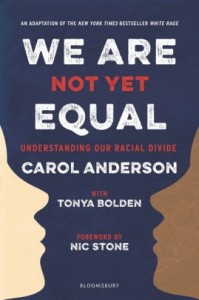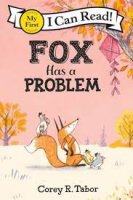Carol Anderson's White Rage took the world by storm, landing on the New York Times bestseller list and best book of the year lists from New York Times, Washington Post, Boston Globe, and Chicago Review of Books. It launched her as an in-demand commentator on contemporary race issues for national print and television media and garnered her an invitation to speak to the Democratic Congressional Caucus. This compelling young adult adaptation brings her ideas to a new audience.
When America achieves milestones of progress toward full and equal black participation in democracy, the systemic response is a consistent racist backlash that rolls back those wins. We Are Not Yet Equal examines five of these moments: The end of the Civil War and Reconstruction was greeted with Jim Crow laws; the promise of new opportunities in the North during the Great Migration was limited when blacks were physically blocked from moving away from the South; the Supreme Court's landmark 1954 Brown v. Board of Education decision was met with the shutting down of public schools throughout the South; the Civil Rights Act of 1964 and Voting Rights Act of 1965 led to laws that disenfranchised millions of African American voters and a War on Drugs that disproportionally targeted blacks; and the election of President Obama led to an outburst of violence including the death of black teen Michael Brown in Ferguson, Missouri as well as the election of Donald Trump.
This YA adaptation will be written in an approachable narrative style that provides teen readers with additional context to these historic moments, photographs and archival images, and additional backmatter and resources for teens.--from the publisher
288 pages 978-1547600762 Ages 12-18
******************
“I am not poison,
no I am not poison
Just a boy from the hood that
Got my hands in the air in despair
Don’t shoot!”
-- Jay-Z “Spiritual” (2016)
“President Trump buoyed the white nationalist movement on Tuesday as no president has done in generations -- equating activists protesting racism with the neo-Nazis and white supremacists who rampaged in Charlottesville, Va., over the weekend.
Never has he gone as far in defending their actions as he did during a wild, street-corner shouting match of a news conference in the gilded lobby of Trump Tower, angrily asserting that so-called alt-left activists were just as responsible for the bloody confrontation as marchers brandishing swastikas, Confederate battle flags, anti-Semitic banners and ‘Trump/Pence’ signs.
‘Thank you President Trump for your honesty & courage to tell the truth,’ David Duke, a former Ku Klux Klan leader, wrote in a Twitter post shortly after Mr. Trump spoke.”
-- New York Times, August 17, 2017
“President Trump on Thursday balked at an immigration deal that would include protections for people from Haiti and some nations in Africa, demanding to know at a White House meeting why he should accept immigrants from ‘shithole countries’ rather than from places like Norway, according to people with direct knowledge of the conversation.”
-- New York Times, January 11, 2018
“White rage doesn’t have to wear sheets, burn crosses, or take to the streets. Working the halls of power, it can achieve its ends far more effectively, far more destructively.
The trigger for white rage, inevitably, is black advancement. It is not the mere presence of black people that is the problem; rather, it is blackness with ambition, with drive, with purpose, with aspiration, and with demands for full and equal citizenship. It is blackness that refuses to accept subjugation, to give up, A formidable array of policy assaults and legal contortions has consistently punished black resilience, black resolve…
It is only by recognizing the roots of this rage that we can build a future without it.”
If you are angry about having to live with a racist president in the White House, this book will make you even angrier. WE ARE NOT YET EQUAL: UNDERSTANDING OUR RACIAL DIVIDE closely examines the policy assaults and legal contortions that were undertaken in response to five American history landmarks that made things more equal for African Americans.
These landmarks include the end of the Civil War and ratification of the 13th, 14th, and 15th Amendments; the Great Migration; the Brown v. Board of Education Supreme Court decision; enactment of the Civil Rights Act and Voting Rights Act; and the election of America’s first black president.
After reading this history of the deliberately-imposed backward steps that have followed black advancement in America, one could conclude that Trump falls into a rogue’s gallery of racist presidents alongside Andrew Johnson, Richard Nixon, and Ronald Reagan. But there is also abundant evidence here to blemish the legacies of many other white men who have occupied the Oval Office, Congress, various statehouses, and the New York mayor’s office.
I pride myself on having read many books that examine aspects and incidents of racism in American history. But I am shocked by how much I didn’t know before reading WE ARE NOT YET EQUAL. There is so much packed into this book, and so much of the history discussed has taken place during my lifetime.
Personally, I received a great public education, but had no idea that millions of my generation were deprived of public education by governors, state legislators, and local officials who literally shut down public schools for years rather than comply with the 1954 Brown decision.
Despite being an adult consumer of the news during the Iran Contra scandal, I never before understood the full extent to which Reagan mercilessly attacked America’s black communities. This book lays it out clearly.
In our recent election cycle, the Georgia Secretary of State (who is now the incoming governor) disenfranchised as many black voters as possible. It is enlightening to read about the genesis of the GOP’s campaign to suppress the black vote under the guise of protecting the integrity of the ballot box from voter fraud. And it is infuriating to read about the latest tricks in the GOP’s repertoire of black voter suppression measures.
Which brings us to the authors’ detailed explanation of the Supreme Court’s 2013 evisceration of the Voting Rights Act in Shelby County v. Holder. This is the decision that facilitated all of these new black voter suppression measures. In my opinion, Shelby will go down in American history as being as backward and harmful to America as Dred Scott v. Sandford and Plessy v. Ferguson.
From cover to cover, this impeccably-researched and referenced book provides endless examples of how and why we are not yet equal. It will be up to readers to imagine themselves in the shoes of black Americans and to work for fulfilling America’s not-yet-delivered promises of justice and equality for all.
288 pages 978-1-547-60076-2 Ages 12-18
Recommended by: Richie Partington, MLIS
See more of his recommendations: Richie's Picks https://richiespicks.pbworks.






